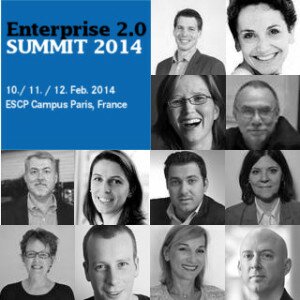 In this edition of pre-conference interviews we ask Rachel Happe the questions.
In this edition of pre-conference interviews we ask Rachel Happe the questions.
Rachel is, according to , “Connector of ideas & people. Fascinated by social dynamics & false truths.”. She’s also the co-founder of The Community Roundtable, dedicated to advancing the business of community.
Rachel will share her knowledge and expertise during the expert panel; “Driving the Engagement & Adoption“.
Rachel, you are a speaker at Enterprise 2.0 SUMMIT in Paris in a session on adoption and engagement management. What are the three tags that label best the key focus of your talk?
It may not be obvious now but I would say #motivation, #ability and #triggers – getting the mix of those three things right will increase engagement and they are part of a template we’ve built called an “Engagement Recipe” which uses the research of B.J. Fogg, founder of Stanford’s Persuasive Technology Lab.
What are the key drivers for driving the engagement on social platforms in a work environment?
My perspective is that without a compelling community strategy that balances the needs of the organization with the needs of the employees, it is really hard to drive effective engagement.
Why do we have to talk about internal community management? Isn’t the community management just needed in the case when the social initiative is not in line with the business goals (because when it is everybody is naturally motivated and engaged in the social interaction)?
I actually think community management may be more important internally because people have established ways of getting work done and while not necessarily efficient, behaviors are very difficult to change. The role of the community manager internally is to inspire, establish and normalize a behavior change because that behavior change is what will drive ROI. That is very hard work, especially in the beginning. Without someone proactively creating the conditions for the change in work habits, watching for issues and opportunities and rewarding new behaviors, it’s really hard to be successful with social business initiatives.
What are the roles of the internal community management? And how does this differ from the project management of the social initiative?
I like to think of community management as the human experience (HX) that needs to mirror the user experience (UX) of the social application. Together they enable people to work in new ways that are wildly more efficient and innovative. The community manager’s primary responsibility is to be a coach and a resource for people where the project manager is really about making sure the initiative is on track, has the budget it needs and is resourced to succeed. They could be the same person but I find community managers excel at encouraging and rewarding emergent behaviors – and are very comfortable with ambiquity and the messiness that comes from working with people and that project managers are typically more focused on creating the top down structure. Organizations need both and there it a natural and healthy tension between the two but few individuals can do both well.
What are your expectations on the future for the internal community management?
At The Community Roundtable we view community management as both a defined role and as a discipline of general management so to me, when I look to the future, a community management approach will be required of all managers and executives. Community management is ultimately about getting what you want or need accomplished without telling people what to do.As things become more transparent and everyone needs to take personal responsibility for their contributions and rewards, I think the era of managing other people’s work with fall away. Instead it will be replaced by providing a compelling vision, inspiring people to change with you and helping people understand where they can contribute. So everyone who wants to lead in an organization will have to be a community manager, regardless of their actual title.
If you want to learn more, visit the Enterprise 2.0 Summit for the expertise panel: Driving the Engagement & Adoption.












5 thoughts on “Rachel Happe: A Community Manager has to inspire, establish and normalize a behavior change, this drives ROI”